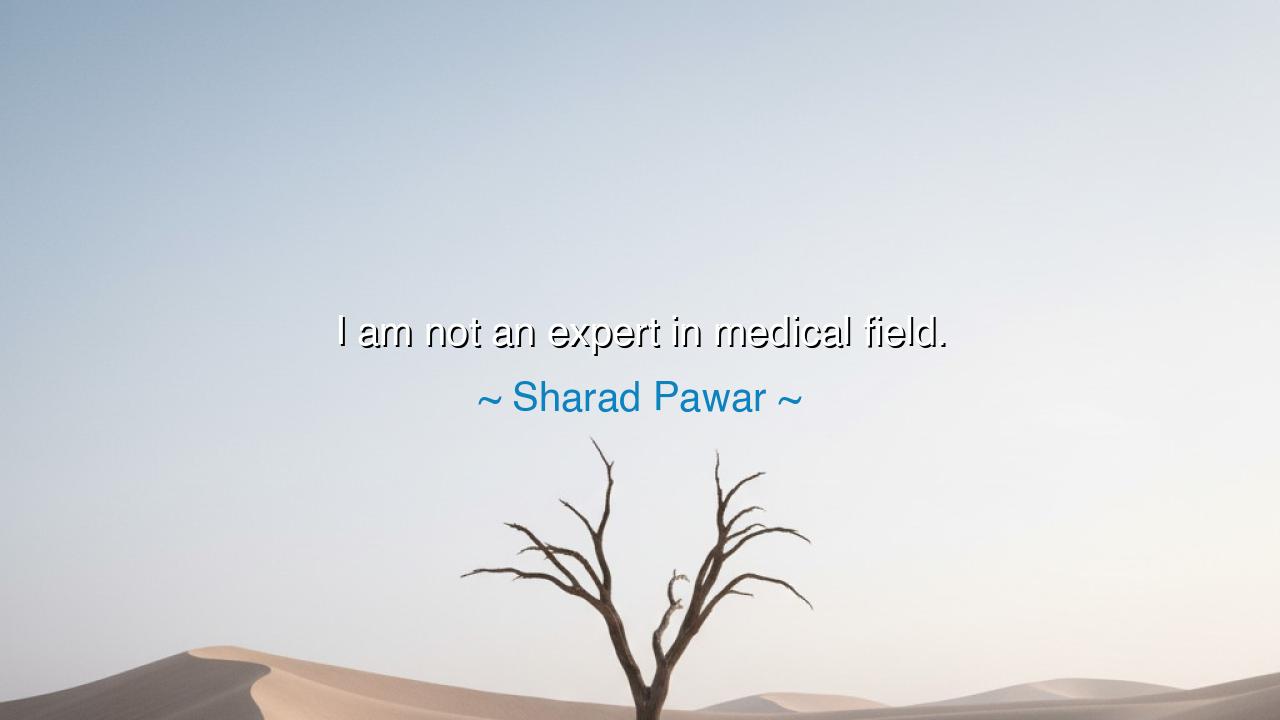
I am not an expert in medical field.






The words of Sharad Pawar—“I am not an expert in medical field”—though modest and brief, hold the gravity of wisdom that only humility can bring. They are not an admission of weakness, but an acknowledgment of boundaries, a recognition that even the greatest leaders and thinkers must bow before the vastness of human knowledge. In an age where pride often wears the mask of authority, his words stand as a beacon of integrity. For it is the mark of the truly wise to know where their understanding ends, and to respect the realms that belong to others.
In the ancient world, this humility was considered sacred. The Greek philosopher Socrates declared, “I know that I know nothing,” and in those words, the roots of wisdom were planted. Sharad Pawar, a statesman and leader, echoed this timeless truth in his own way. His statement reminds us that power and position do not grant mastery over all things. The medical field, with its complexity and depth, is the domain of those who have devoted their lives to learning the delicate balance between life and death, sickness and healing. To claim authority without knowledge would be folly; to admit one’s limits, however, is strength.
The origin of such a statement can be found in the context of leadership and responsibility. When great decisions must be made—especially those that affect lives and health—it is essential that one who governs listens to the counsel of those more learned. Pawar’s quote reveals not ignorance, but discernment: the understanding that leadership is not about knowing everything, but about knowing whom to trust. In moments of crisis, such as a pandemic or public health challenge, this humility becomes the foundation of wise governance. A ruler who confesses, “I am not an expert,” opens the door for experts to step forward, and through collaboration, a nation finds its strength.
History, too, offers us stories of this noble humility. During the great plague of London in 1665, King Charles II did not pretend to possess medical wisdom. Instead, he called upon physicians, alchemists, and natural philosophers, among them Robert Hooke and Sir Isaac Newton, to understand the nature of disease. While the king wielded political power, he placed his trust in the minds that sought scientific truth. Thus, through deference to knowledge, he preserved the hope of his people. Had he chosen arrogance instead of humility, the cost would have been far greater. In every age, the leader who admits his limits saves more lives than the one who pretends to omniscience.
The medical field itself is a temple of discipline, built upon centuries of observation, sacrifice, and compassion. Those who serve within it—doctors, nurses, healers—walk a path that demands both intellect and heart. To speak lightly of their craft, or to assume mastery without training, is to profane the sacred trust they carry. When Sharad Pawar declared that he was not an expert, he did not diminish himself—he elevated the sanctity of their work. His humility pays tribute to those whose calling is to heal, and whose labor holds the fragility of human life in steady hands.
But beyond the surface of the quote lies a deeper teaching: that every person, no matter how powerful or accomplished, must know when to learn and when to listen. The ancients taught that wisdom is not measured by the breadth of what one knows, but by the sincerity of one’s curiosity. To say “I am not an expert” is to keep the mind open—to invite learning instead of clinging to illusion. It is a reminder that in the symphony of society, each instrument has its own place. The statesman governs, the physician heals, the teacher enlightens, and the farmer sustains—all in harmony.
And so, my child of understanding, take this lesson to heart: never fear to admit what you do not know. Let humility be your compass in the pursuit of truth. When faced with the unknown, do not speak louder—listen deeper. Honor those whose wisdom surpasses your own, and let collaboration, not pride, guide your choices. For the world is too vast for any one mind to master, but together, through mutual respect and shared knowledge, humanity becomes whole.
In the end, Sharad Pawar’s words are more than a statement—they are a principle. They teach us that greatness is not found in the illusion of knowing all things, but in the grace of acknowledging what we do not. When leaders, healers, and citizens alike embrace this truth, ignorance gives way to enlightenment, and arrogance to wisdom. For only the humble can truly learn—and only the learner can lead.






AAdministratorAdministrator
Welcome, honored guests. Please leave a comment, we will respond soon